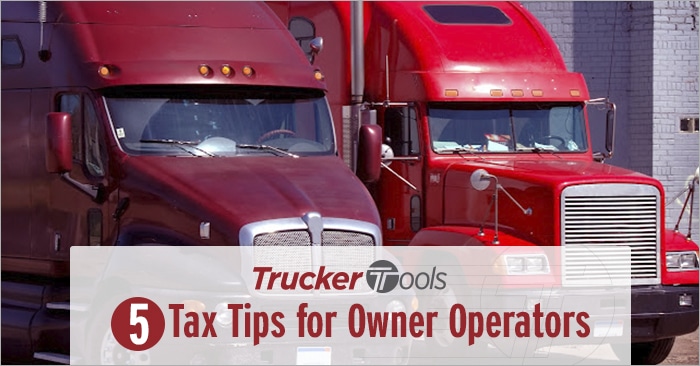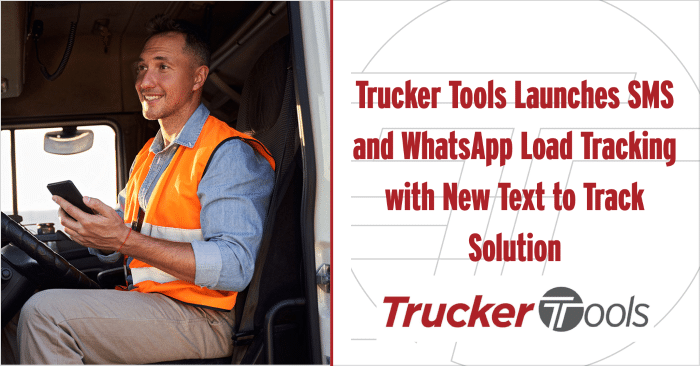Whether you’re just starting out as an owner operator or you’re a seasoned pro, staying on top of your finances and tax responsibilities is vital when you operate as a small business. When you’re no longer a W-2 employee, you are responsible for paying your own taxes, which is a big change from being a company driver. Even if you’re running under a trucking company’s authority, you’re required to pay both federal and state income taxes, as well as self-employment taxes. While the April 15 filing deadline is still months away, now is a good time to make sure you have good bookkeeping and financial habits in place so that you don’t have a big tax bill or face penalties from the IRS down the road.
Check out these five tax tips for owner operators.
1. Find or Create a System for Tracking Expenses
Without documentation, you can’t take the deductions, per diems and tax credits that are available to you as an owner operator. Even if you hire an accountant to complete and submit your tax returns, you must have some type of system for tracking how much you spend on meals, fuel, lodging, tolls, your truck, insurance and other expenses. Some owner operators use mobile apps and desktop software to track expenses, while others may use spreadsheets or folder systems to do so. Whatever system you decide upon, make sure you’re diligent about keeping receipts and tracking every penny you spend related to your job.

2. Make Quarterly Tax Payments
Unless you’re a disciplined saver, it’s a good idea to make quarterly estimated tax payments to the IRS. The IRS allows you to estimate the amount of your quarterly taxes based on your previous year’s tax return. Paying federal income taxes on a quarterly basis allows you to spread out your tax payments over the course of the year instead of owing a large, lump sum when you file your taxes each year. You can request quarterly payment vouchers from the IRS for the following year when you file your taxes and mail your quarterly payments, or you can submit your quarterly tax payments online through IRS.gov. Depending on your income, it may make sense to pay your state income taxes on a quarterly basis, as well.
3. Don’t Estimate Income and Expense Amounts
As an owner operator, you may overpay on your taxes and/or face substantial fines from the IRS/state tax authority if you don’t have a system in place to accurately track and document your expenses and earnings each year. IRS audits are sometimes triggered by round numbers submitted in tax returns. Use exact amounts on your state and federal returns. This applies to expenses, donations to charities, income, retirement income and itemized deductions. If you are audited, you’ll need a paper trail to back up what you’ve submitted to the IRS. Be sure to track all of your operating expenses, including start-up costs, licensing and permitting fees, truck repairs and supplies so that you can deduct those expenses and reduce your tax bill.
4. Take Per Diems To Reduce Your Tax Burden
Speaking of expenses and deductions, if you’re an independent owner operator and report income on a 1099-MISC form, you are eligible to take a meal per diem when you’re away from home overnight on a load. The advantage of taking a per diem is that you’re not taxed on per diems and it reduces the gross income that you’re required to report. The daily per diem rate Jan. 1, 2021 through Sept. 30, 2021, was $66 in the continental United States. Starting Oct. 1, 2021, the daily per diem rate was increased to $69. Since the Federal Consolidated Appropriations Act of 2021 was passed in late 2020, you are allowed a 100 percent deduction on per diems. For more information on recent changes to per diems, check out this per diem tax break guide from ATBS.

5. File and Pay Heavy Highway Vehicle Use Tax
We recently spoke with Barry Fowler, president and founder of Trucker Tax Tools, to find out what mistakes he sees owner operators making in relation to their taxes. Barry told us that he recently worked with a trucker who neglected to pay Heavy Highway Vehicle Use Tax for several years and ended up owing the IRS more than $130,000. The Heavy Highway Vehicle Use Tax applies to any vehicles that are designed to transport loads over public highways. This tax only applies to vehicles with a taxable gross weight of 55,000 pounds or more. If you have 25 or more vehicles over 55,000 pounds, you must e-file through the IRS.
If you’re new to the trucking industry, don’t miss Je’Ron Hamm’s Trucking Tips for New Drivers and Carriers.
To download the Trucker Tools app, visit https://www.truckertools.com/carriers/. To start using Trucker Tools’ free carrier software platform, visit https://bookaload.truckertools.com/.






